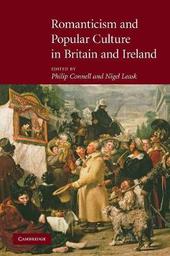
|
Romanticism and Popular Culture in Britain and Ireland
Paperback / softback
Main Details
| Title |
Romanticism and Popular Culture in Britain and Ireland
|
| Authors and Contributors |
Edited by Philip Connell
|
|
Edited by Nigel Leask
|
| Physical Properties |
| Format:Paperback / softback | | Pages:332 | | Dimensions(mm): Height 150,Width 226 |
|
| Category/Genre | Literary studies - c 1800 to c 1900 |
|---|
| ISBN/Barcode |
9780521349604
|
| Classifications | Dewey:820.9007 |
|---|
| Audience | | Postgraduate, Research & Scholarly | |
|---|
| Illustrations |
Worked examples or Exercises
|
|
Publishing Details |
| Publisher |
Cambridge University Press
|
| Imprint |
Cambridge University Press
|
| Publication Date |
30 June 2011 |
| Publication Country |
United Kingdom
|
Description
From the ballad-seller to the Highland bard, from 'pot-house politics' to the language of low and rustic life, the writers and artists of the British Romantic period drew eclectic inspiration from the realm of plebeian experience, even as they helped to constitute the field of popular culture as a new object of polite consumption. Representing the work of leading scholars from both Britain and North America, Romanticism and Popular Culture in Britain and Ireland offers a series of fascinating insights into changing representations of 'the people', while demonstrating at the same time a unifying commitment to rethinking some of the fundamental categories that have shaped our view of the Romantic period. Addressing a series of key themes, including the ballad revival, popular politics, urbanization, and literary canon-formation, the volume also contains a substantial introductory essay, which provides a wide-ranging theoretical and historical overview of the subject.
ReviewsReview of the hardback: '... this volume provides a valuable overview of an important sub-area of modern Romantic studies, along with diverse specialised studies from which readers are bound to select those of particular interest to themselves. Elegantly produced, as one would expect from Cambridge University Press, the collection has been tightly edited by Connell and Leask and should be an important resource for scholars and postgraduates for years to come.' Literature and History
|